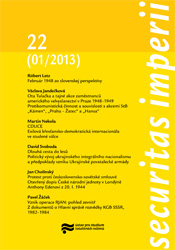Dlouhá cesta do lesů Politický vývoj ukrajinského integrálního nacionalismu a předpoklady vzniku Ukrajinské povstalecké armády
A long way through the woods. Political developments in Ukrainian integral nationalism and the presumptions of the Ukrainian Resistance Army
Author(s): David SvobodaSubject(s): Security and defense, Nationalism Studies, Interwar Period (1920 - 1939), WW II and following years (1940 - 1949)
Published by: Ústav pro studium totalitních režimů
Keywords: Ukraine;Organization of Ukrainian nationalists;Ukrainian Resistance Army
Summary/Abstract: The article deals with the genesis and development of Ukrainian integral nationalism. It describes its roots and tries to elucidate the problem of its social basis and general reception as well as its mental leanings in the context of the major changes taking place in interwar Europe. The grassroots of this powerful movement were represented by radical Ukrainian-Galician youth deeply embittered by the failed attempt to establish an independent Ukrainian state on the ruins of the Romanov and Habsburg empires and gradually embracing totalitarian concepts as a way out of its underdog status in interwar Polish Rzeczpospolita. Far from being an ideological monolith, the Ukrainian underground movement represented from the late 1920’s by the Organization of Ukrainian nationalists (OUN) was undergoing a conflict of generations and political agendas. The main division line ran roughly between the home-based “krajoviks” and the Leadership (“Provid”) under the aegis of European powers with Germany in the first place. The course of events in the late 1930’s was a catalyst of inner developments within OUN as it had to take a clear stance toward the new challenges stemming from Hitler’s expansionist policy at the cost of OUN’s foes. Following the fall of Polish republic the young adherents of Stepan Bandera got the upper hand in OUN in terms of activity and ideological fervor. The OUN-b thus set a basic paradigm of Ukrainian nationalism. Its botched attempt to declare Ukrainian sovereignty in 1941 helped deepen the trench between its members and German occupational authorities. From that moment on the OUN-b started its gradual shift toward anti-German resistance. This battlefield, however, had only to be one of many.
Journal: Securitas imperii
- Issue Year: 2013
- Issue No: 22
- Page Range: 98-120
- Page Count: 23
- Language: Czech

